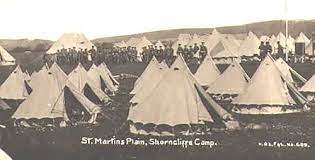While researching for republishing a volume of poetry written by a Canadian soldier poet in WW1, I noticed a mention of Shorncliffe Camp in Kent, England. As my Grandfather, who was a professional soldier with the British Royal Field Artillery, was stationed at Shorncliffe Camp for a while in 1913, I had to find out more. I discovered a marvellous website that features a WW1 poem and contacted the website administrator - Christine Warren - who very kindly sent me this information, with permission to share the poem with you.
Private Charles Davies (1893 - ?) from Winnipeg, Manitoba, Canada, who served during the First World War in the 12th Canadian Field Ambulance, wrote the following lines which were published in a Canadian newspaper in 1919. Christine Warren found the poem in the book “Coast of Conflict” by Michael & Martin George. Christine typed it out and added it to the Military page of her Folkestone Then & Now website https://www.warrenpress.net/FolkestoneThenNow/FolkestoneThen_Now.html
“SHORNCLIFFE CAMP” by Private Charles Davies
Folkestone, though Queen of the Southern Coast,
I'm loath to leave your grassy warren;
Those steep white cliffs that beacon like a genial host
Receding from my eyes night dim with tears.
What soothing hours and happy days so dear does memory recall;
The walk along the Leas, the leafy undercliff, and Oh, that changing sea,
When the rich red sunset sparkles on thy face,
Such are my thoughts of thee picture of grace.
Garden of England! Men of Kent!
Think of your heritage; the flowers sweet scent,
That wooded glade at Seabrook, primrose clad;
The glimpse of moving picture shore to make you glad.
Those verdant meads of Shorncliffe Plain,
Bright green as emeralds after rain.
Deep down in mist of blue lies sleeping Sandgate town,
Whose twinkling lights shine like some fairy's crown.
St. Martin's spire, neath which brave Plimsol sleeps,
Whose noble work the British sailor reaps;
The bugle blasts and all war's grim array,
Much as it did in Moore's fair distant day.
Not even the mists of Passchendaele and its blood strewn duckboard track
Can blot from out my memory the charm of Radnor Park,
Who would not fight for thee, dear land,
For every flower and Kentish maid's fair hand.
Who cares for the muddy trenches and the shrapnel's piercing scream,
The waves of poison and all the ghastly scene?
There are those away in the Golden West dearer than Nelson's name-
Mothers and wives and sisters; it's for them we play the game.
 |
| Shorncliffe Camp |
Shorncliffe Army Camp is a large military camp near Cheriton in Kent, UK. Established in 1794, it later served as a staging post for troops destined for the Western Front during the First World War. In April 1915 a Canadian Training Division was formed at Shorncliffe Camp. The Canadian Army Medical Corps had general hospitals based at Shorncliffe from September 1917 to December 1918. The camp at that time was composed of five unit lines known as Moore Barracks, Napier Barracks, Risborough Barracks, Ross Barracks and Somerset Barracks. On three occasions there were German air raids which killed soldiers in the camp.
Additional information from:
https://en.wikipedia.org/wiki/Shorncliffe_Army_Camp
https://torontopostcardclub.com/tag/shorncliffe-camp/
https://www.frittendenarmistice.co.uk/Armistice_1918/file/early.php